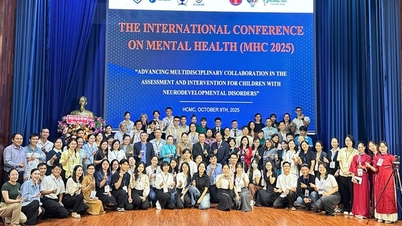
Absorbing minerals reduces the incidence of depression - Photo: FREEPIK
According to News Medical , researchers have examined the relationship between mineral intake and the incidence of depression.
They found that Korean adults with higher potassium and sodium intakes were less likely to experience depression. This finding was similar to that of American adults with higher potassium and zinc intakes.
Depression is predicted to become a major global health burden. In South Korea, about 5% of adults report having a depressive disorder, while in the United States, more than 17 million adults experience at least one major depressive episode each year.
Many people with the condition remain untreated, often due to stigma and reluctance to seek help, and high relapse rates make management challenging. Nutrition is increasingly linked to mental health, with deficiencies in minerals such as magnesium, zinc and selenium linked to cognitive decline and psychiatric conditions.
However, the role of sodium and potassium in depression has received little attention, despite their abundance in the diet. Sodium is primarily consumed as table salt, while potassium is found in a variety of foods.
In the analysis, the researchers used data from health and nutrition surveys in both countries. Korean adults aged 19 and older and American adults aged 18 and older who completed depression screening were included in the study, excluding pregnant women, those being treated for depression, or those with missing primary data.
Results showed that in both countries, people with depression were more likely to be female, have lower income and education levels, live alone, have higher depression screening scores, higher rates of smoking, and higher rates of diabetes and other diseases.
Potassium was the only mineral found to be associated with a lower risk of depression in both countries, highlighting its potential for mental health. Notably, magnesium and calcium did not show a significant association with depression in either population.
Limitations of the study include the use of a self-reported measure of depression, which may have biased the results. However, the findings suggest that dietary mineral intake may be useful in mental health strategies, and further research is needed to clarify the mechanisms linking minerals to depression risk.
Source: https://tuoitre.vn/che-do-an-ra-sao-giup-giam-nguy-co-tram-cam-20250824223858974.htm


![[Photo] Ho Chi Minh City is brilliant with flags and flowers on the eve of the 1st Party Congress, term 2025-2030](https://vphoto.vietnam.vn/thumb/1200x675/vietnam/resource/IMAGE/2025/10/10/1760102923219_ndo_br_thiet-ke-chua-co-ten-43-png.webp)
![[Photo] General Secretary attends the parade to celebrate the 80th anniversary of the founding of the Korean Workers' Party](https://vphoto.vietnam.vn/thumb/1200x675/vietnam/resource/IMAGE/2025/10/11/1760150039564_vna-potal-tong-bi-thu-du-le-duyet-binh-ky-niem-80-nam-thanh-lap-dang-lao-dong-trieu-tien-8331994-jpg.webp)



![[Photo] Opening of the World Cultural Festival in Hanoi](https://vphoto.vietnam.vn/thumb/1200x675/vietnam/resource/IMAGE/2025/10/10/1760113426728_ndo_br_lehoi-khaimac-jpg.webp)






























































































Comment (0)